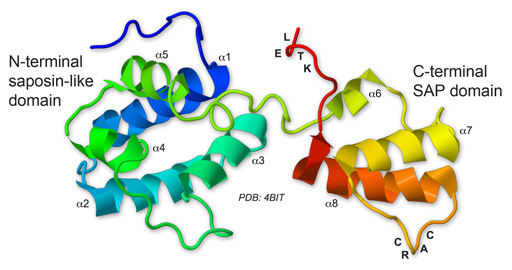Herantis Pharma Granted Almost 3 Million Euro Government Loan For Parkinson’s Study

Tekes, the Finnish Funding Agency for Innovation, has granted a 2,903,000 EUR R&D loan to Herantis Pharma Plc. — a Finnish a pharmaceutical company that specializes in new drug research and development — to support its clinical study of Cerebral Dopamine Neurotrophic Factor (CDNF), a proprietary neuroprotective and neurotrophic protein patented worldwide by Herantis for treatment of Parkinson’s disease. The loan was granted conditionally subject to obtaining regulatory approval for the clinical study.
Tekes is the most important publicly funded expert organisation in Finland for financing research, development and innovation. The Agency supports wide-ranging innovation activities in research communities, industry and service sectors. Tekes works with the top innovative companies and research units in Finland. Tekes research, development and innovation funding is targeted to projects that create the greatest long-term benefits for Finland’s economy and society. The agency does not derive any financial profit from its activities, nor claim any intellectual proprietary rights.
Parkinson’s disease is the second most common neurodegenerative disease after Alzheimer’s. A slowly progressing neurodegenerative disorder, Parkinson’s is caused by death of dopaminergic neurons in in a region of the midbrain called substantia nigra for reasons unknown. Dopamine is a neurotransmitter that carries signals between the areas of the brain that regulate and control smooth, purposeful motor movement when performing routine tasks like eating, writing and shaving. Common first symptoms of Parkinson’s include tremors, rigidity and slowness of movement. While the motor symptoms can be treated with medication the disease’s progression cannot be prevented, and benefits of medication may fade as the disease progresses, and/or side effects can become problematic. People with late stage Parkinson’s disease have many disabling symptoms including: trouble walking, impaired posture and balance, muscle stiffness and tremors in the arms and hands that make it difficult to perform everyday tasks.
In addition, Parkinson’s disease may cause non-motor symptoms such as sleep problems, depression, and anxiety, which are not alleviated by current Parkinson drugs. An estimated 7 million people worldwide are living with Parkinson’s disease, and the National Institutes of Health estimates that about one million Americans have Parkinson’s disease, and some 50,000 Americans are diagnosed with new Parkinson’s cases annually.
Image courtesy Herantis Pharma Plc
Herantis Pharma Plc specializes in new drug research and development of medicines intended to be first or best in their class and have the potential to change treatment strategies of diseases for which there is a currently unmet clinical need; for example dry eye syndrome, Parkinson’s disease, and secondary lymphedema. Shares of Herantis Pharma Plc are listed on the First North Finland marketplace run by Nasdaq Helsinki stock exchange.
Following a preclinical development program which showed CDNF is efficacious in several preclinical models of Parkinson’s disease, Herantis Pharma, which focuses on diseases with an unmet clinical need like dry eye syndrome, Parkinson’s disease, and secondary lymphedema, is preparing for a first-in-human clinical study of CDNF in the treatment of Parkinson’s disease. Herantis’ CDNF has been studied and shown efficacious in several preclinical models of Parkinson’s disease (see: Lindholm et al, Nature 448: 73-77, 2007; Airavaara et al. Cell Transplant. 21: 1213-1223, 2012) (Image courtesy Herantis Pharma Plc)
In the preclinical studies, CDNF both protected and regenerated dopamine-generating cells, suggesting potential for disease modification of Parkinson’s disease. Signals of efficacy are also seen in non-motor symptoms based on preclinical data (Unpublished data) also suggesting that CDNF has potential to address clinical needs currently unmet by any known therapies.
 “Tekes funding enables us to conduct this study with an optimal design”, says Herantis’ Director of Clinical Development Sigrid Booms. “While that is really valuable for the company it is even more so for patients participating in this study, who can be provided with the best possible chance to benefit from the investigational drug.”
“Tekes funding enables us to conduct this study with an optimal design”, says Herantis’ Director of Clinical Development Sigrid Booms. “While that is really valuable for the company it is even more so for patients participating in this study, who can be provided with the best possible chance to benefit from the investigational drug.”
“Anyone diagnosed with Parkinson’s disease, or close to a person who is, knows how significant an impact this incurable disease has on one’s quality of life”, observes Herantis Pharma CEO Pekka Simula. “We are very excited about our opportunity to translate the results of years of leading academic research to clinical stage, hopefully for the benefit of as many patients as possible.”
Drug development projects are customarily divided into two stages: a preclinical stage, and a clinical stage involving human subjects. The clinical stages can be further classified in three formal phases. Phase 1 clinical studies assess the safety of a drug candidate in human subjects. In Phase 2, the optimal dosing and possible efficacy in the treatment of a particular disease is studied. Phase 3 studies finally aim to establish a statistical proof of safety and efficacy of the drug candidate in typically hundreds or thousands of patients for market approval. Drug development can take 10-15 years from the first preclinical studies to market approval.
Herantis aims to begin its CDNF clinical development program with regulatory submissions in Finland and Sweden by the end of 2015, and patient treatment is expected to commence in the first half of 2016. The company expects to recruit 18 patients with Parkinson’s disease in this first-in-human study of CDNF. In the clinical study, small doses of CDNF will be administered directly into the brains of the patients using a device specially designed for such procedure. Implantation of the device requires a similar surgical procedure as Deep Brain Stimulators, which are commonly used for Parkinson’s disease treatment. The primary outcome of the phase I clinical study is related to assessing the safety and tolerability of the treatment.
For more information, contact Herantis Pharma Plc, Pekka Simula, CEO, telephone: +358 40 7300 445, or visit the company web site: https://www.herantis.com
Sources:
Herantis Pharma Plc
Tekes
National Institutes of Health
Image Credits:
Herantis Pharma Plc






